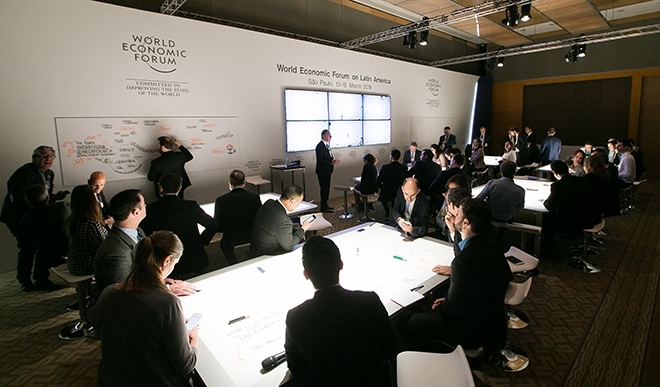

Agrosmart is developing an application that will help farmers apply pesticide cost-effectively and with less environmental impact. Stattus4’s mobile water-leak detector uses artificial intelligence (photo: WEF)
Agrosmart and Stattus4 were selected to join a digital economy acceleration program during the World Economic Forum for Latin America.
Agrosmart and Stattus4 were selected to join a digital economy acceleration program during the World Economic Forum for Latin America.

Agrosmart is developing an application that will help farmers apply pesticide cost-effectively and with less environmental impact. Stattus4’s mobile water-leak detector uses artificial intelligence (photo: WEF)
By Elton Alisson | Agência FAPESP – Two Brazilian startups supported by FAPESP’s Innovative Research in Small Business Program (PIPE) – Agrosmart and Stattus4 – have been selected, together with 48 other startups from elsewhere in Latin America, to join a program that will help accelerate development of the region’s digital economy. The selection was announced during the World Economic Forum on Latin America, held in São Paulo, Brazil, on March 13-15, 2018.
The startups were selected by the International Finance Corporation (IFC), the World Bank’s private-sector lending arm, and the World Economic Forum, plus a committee of experts representing companies and investment funds. The selection criteria included commercial potential, scalability, revenue generation and the home-country technological base.
During the event, the selected startups had an opportunity to network with political leaders, global investors and corporate executives, with whom they talked about prospects for partnership and business development.
“Start-ups in Latin America and the Caribbean are using creative solutions to address not just local but also regional and global problems. Innovators selected in our first list are entrepreneurs with scalable problem-solving visions who require an adequate ecosystem to thrive,” said Marisol Argueta de Barillas, the World Economic Forum’s Head of Regional Strategies for Latin America.
According to the entity’s representatives, startups are set to play a critical role in helping Latin America’s private sector create more innovations. A recent World Bank study shows firms in the region are 20% less likely to introduce a new product than those in countries with similar incomes in Europe and Central Asia.
“Start-ups can play a critical role in promoting innovative solutions to some of the most pressing development challenges in Latin America and the Caribbean,” said Georgina Baker, IFC Vice President for Latin America and the Caribbean, Eastern Europe and Central Asia.
Networking
Of the 50 startups selected to participate in the program, 25 are Brazilian and 25 are based in eight other Latin American countries: Argentina, Chile, Colombia, Ecuador, Guatemala, Mexico, Peru and Uruguay. The Brazilian firms include candidate “unicorns” such as Nubank and Gympass. A unicorn is a startup valued at over US$1 billion.
The selected firms will also join the World Economic Forum’s UpLink initiative, a dedicated network and digital platform through which startups can interact with investors, global peers, multinationals, governments, and universities.
“Participating in this select group of Latin American startups is an excellent opportunity to exchange experiences with other entrepreneurs and discuss what needs to be done to boost business and create new unicorns,” said Mariana Vasconcelos, founding partner of Agrosmart, a digital agriculture firm based in Campinas, São Paulo State.
Agrosmart is developing an application that will be connected to pest traps to help farmers apply the right amount of agrochemical at the right time in order to combat pests more cost-effectively and with less environmental impact.
The project is one of eight selected in December 2017, after a call for proposals issued by the PIPE/PAPPE Grant Program, with funding from FAPESP and FINEP (for more information, see agencia.fapesp.br/27097).
Another startup selected by the IFC and World Economic Forum is Stattus4, based in Sorocaba, São Paulo State. This firm is developing a technology called Fluid to detect potential water leaks by using artificial intelligence. A prototype has been produced with FAPESP’s support (for more information, see agencia.fapesp.br/27471).
“Joining this select group of Latin American startups is extremely important as recognition of our value proposition. Also, it opens the doors for us to expand our network of relationships and partnerships and to increase our visibility,” said Marília Lara, Stattus4’s co-founding partner.
Also in March, Stattus4 was nominee in a competition held during the 2018 World Water Forum in Brasília by UN Environment and SEBRAE, the Brazilian Small Business Support Service, which awarded a prize for the best proposal among innovative water management solutions developed by entrepreneurs or startups.
Republish
The Agency FAPESP licenses news via Creative Commons (CC-BY-NC-ND) so that they can be republished free of charge and in a simple way by other digital or printed vehicles. Agência FAPESP must be credited as the source of the content being republished and the name of the reporter (if any) must be attributed. Using the HMTL button below allows compliance with these rules, detailed in Digital Republishing Policy FAPESP.





